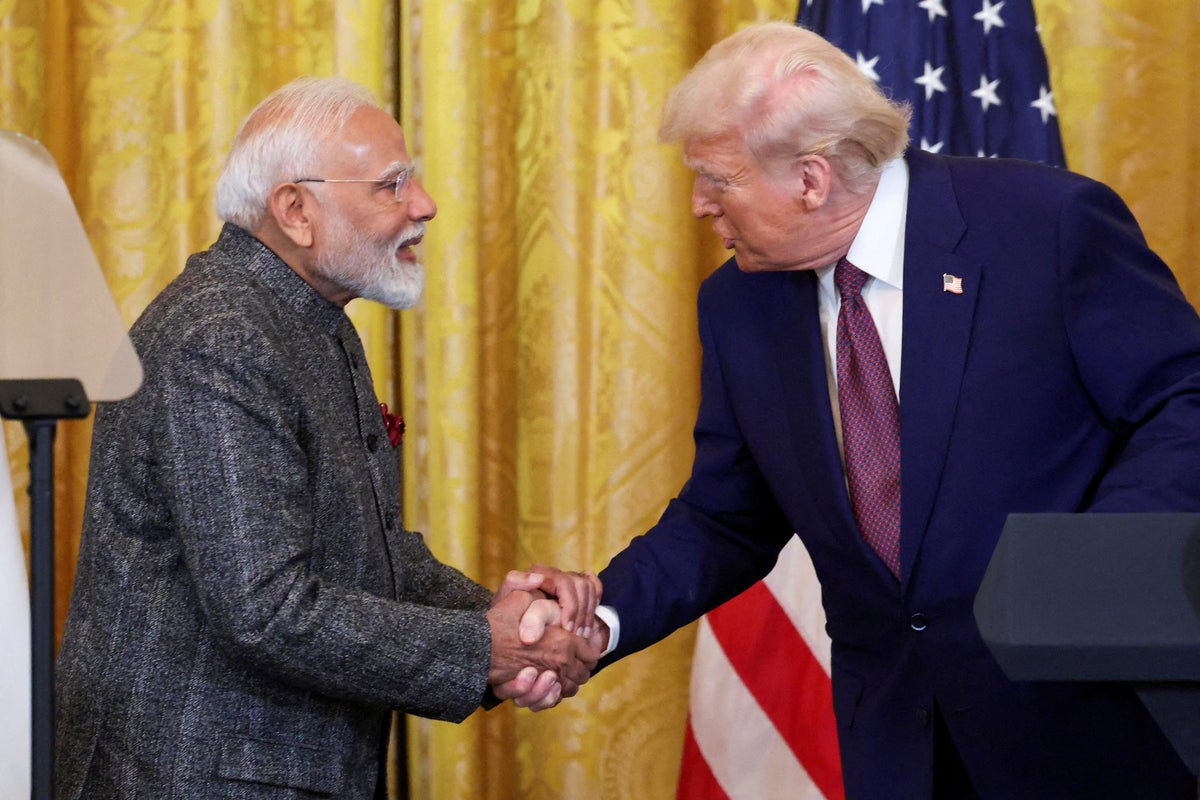
US president Donald Trump has claimed that Indian prime minister Narendra Modi has agreed to halt the import of Russian oil, even as New Delhi has clarified that the discussions on the topic are ongoing.
India’s increasing import of Russian energy since the start of the war in Ukraine has emerged as one of the most contentious points in India-US relations under Mr Trump’s second term. The US has directed its anger towards India for taking advantage of the discounted prices offered by Moscow, which Mr Trump claims have helped fund Vladimir Putin’s war efforts.
The Trump administration imposed secondary sanctions on India with a 50 per cent tariff on goods from the country as a punishment for India’s reliance on Russian energy, putting a strain on India-US ties for the first time in years.
Talking to reporters at the White House, Mr Trump said Mr Modi agreed to phase out the purchase of Russian oil during a conversation on Wednesday, which was previously not disclosed.
Mr Trump called it a “big step” and said India will halt imports “within a short period of time”.
“I was not happy that India was buying oil, and he assured me today that they will not be buying oil from Russia,” Mr Trump told reporters at the White House, referring to Mr Modi. “That’s a big step. Now I’ve got to get China to do the same thing.”
Mr Trump added that India could not “immediately” halt shipments, calling it “a little bit of a process, but that process will be over soon”.
The Indian foreign ministry did not confirm if it was complying with Mr Trump’s demand, but said discussions have been ongoing.
Randhir Jaiswal, a spokesperson for the Ministry of External Affairs, said in Thursday’s statement that India’s energy policies are guided by the need to safeguard consumer interests, ensure stable prices, and secure diversified supplies, and that no definitive decision on Russian oil imports has been announced.
“India is a significant importer of oil and gas. It has been our consistent priority to safeguard the interests of the Indian consumer in a volatile energy scenario. Our import policies are guided entirely by this objective,” Mr Jaiswal said.
“Ensuring stable energy prices and secured supplies have been the twin goals of our energy policy. This includes broad-basing our energy sourcing and diversifying as appropriate to meet market conditions,” the statement added.
“Where the US is concerned, we have for many years sought to expand our energy procurement. This has steadily progressed in the last decade. The current Administration has shown interest in deepening energy cooperation with India. Discussions are ongoing,” it said.
India, which is the world’s largest importer of oil, has become a major importer of Russian crude since the start of the war in 2022, from buying almost nothing prior to the invasion. India imported 1.62 million barrels per day in September, roughly one third of the country’s oil imports. However, China remains the largest buyer of Russian energy through both seaborne and pipeline imports.
India has accused Washington of singling out New Delhi as Mr Trump has largely avoided placing similar pressure on China.
Analysts believe that a US trade war with Beijing has complicated diplomatic efforts, with Mr Trump reluctant to risk further escalation by demanding a halt to Chinese energy imports from Russia. The US is now ramping up pressure on Japan to stop importing Russian energy.
US treasury secretary, Scott Bessent, said he told Japanese finance minister Katsunobu Kato at a meeting in Washington that the Trump administration expects Japan to stop importing Russian energy.
“Minister Kato and I also discussed important issues pertaining to the US-Japan economic relationship and the Administration’s expectation that Japan stop importing Russian energy,” Mr Bessent said on X.
Tokyo has already pledged to phase out Russian oil imports as part of the G7’s coordinated sanctions response to Russia’s 2022 invasion of Ukraine. However, Japan continues to buy Sakhalin Blend crude – a byproduct of liquefied natural gas (LNG) production from the Sakhalin-2 project in Russia’s Far East. The energy source remains crucial for Japan, providing about 9 per cent of its total LNG imports, a key component of its energy security.
“Japan will do what it can based on the basic principle of coordinating with G7 countries to achieve peace in Ukraine in a fair manner,” Mr Kato told reporters, when asked whether Japan was urged by Mr Bessent to stop importing Russian energy.
